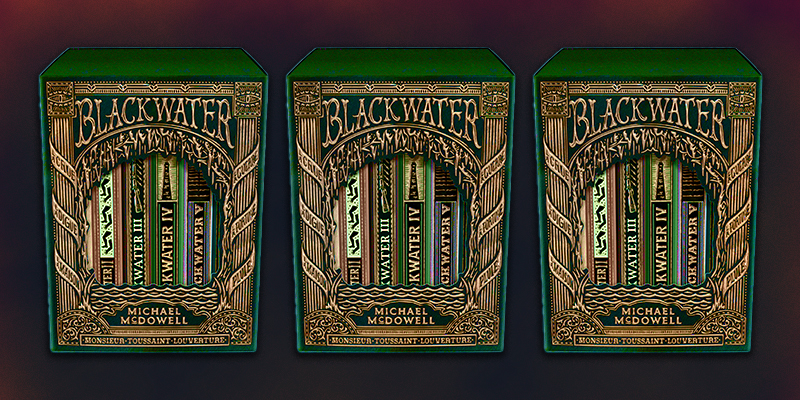The novelist and screenwriter Michael McDowell (1950-1999) published his debut novel The Amulet, a horror novel set in his native Alabama, in 1978. He wrote 32 more books, and Stephen King once called McDowell “the finest writer of paperback originals in America today.” Today, he remains best known as a collaborator of the film director Tim Burton, for whom McDowell wrote the screenplays for Beetlejuice and A Nightmare Before Christmas. While Beetlejuice remains iconic – and the sequel released last year a global blockbuster – it may be Blackwater, a six-volume horror series McDowell published in 1983, that proves to be his legacy.
But the recent resurgence of the Blackwater novels–set in Perdido, Alabama in the early 20th century– has begun in Europe, rather than the United States. The book only remains in print in the US thanks to Valancourt Books, which republished it as a single volume in 2017, and that edition has sold around 3000 copies, according to Bookscan.
In Europe, by contrast, the series has become a bestselling juggernaut. El Pais reported that in France alone, Blackwater has sold over 1,150,000 copies, and over 300,000 in Italy. In Spain, it was the bestselling book of the year, selling over 700,000 copies. The European edition of Blackwater is stunning, with glinting spines and gilding that makes them look like jewels, and the publishers are making a massive promotional effort for the books, while acquiring the rights to McDowell’s backlist for future publication.
“Michael would be gratified by this turn of events,” Laurence Senelick, McDowell’s partner of over twenty years, wrote over email. “Although in interviews he insisted that he was a commercial author, he was grieved that his books could not be easily found in airport bookstalls and failed to get the press attention other authors received.”
Blackwater follows the Caskey family over fifty years, beginning in 1919 Perdido, Alabama in the wake of a devastating flood. The tale commences when Oscar Caskey, eldest son of the wealthiest family in town, rescues a young woman, Elinor Dammert, from the flood wreckage. With charm, intelligence, and hair as red as Perdido mud, Elinor quickly ingratiates herself with the Caskey family, while harboring a secret: she is not a woman—but a river monster.
Senelick added, “[Blackwater] is an outstanding work of imaginative fiction which failed to receive the attention it deserved during Michael’s lifetime. The fact that it appeals in other languages to other cultures indicates the enduring qualities in the work.”
In Blackwater, the initial power struggles primarily take place between Elinor and Oscar’s mother, Mary Love Caskey. In true Southern fashion, the women engage in a quasi-cold war, each deftly injuring the other with quiet gestures. The result is a tense, decades-long battle between the two, that McDowell fleshes out with captivating prose.
Of course, amid the family drama, horror “strikes like lightning,” said Nathan Ballingrud, the acclaimed horror writer who wrote the introduction for the Valancourt edition. “McDowell very successfully used [horror] as a seasoning,” he explained. “I think what appeals to me about it, and what I’m guessing appeals to other people, is that it is so much about what we all experience, even if it’s in this exaggerated, Southern Gothic, generational family framework.”
In his introduction to Blackwater, Ballingrud also described the work as “subversively progressive.” For one, Caskey women are the powerhouses of the home and the family mining business. Then, there’s McDowell’s treatment of are characters who, while not outrightly labeled, are unmistakably queer. The most prominent is James Caskey, “marked by the stamp of femininity,” who is lovingly described throughout the book. Later in the series, one of the Caskey daughters has “special” female friends and eventually starts a family with a woman. McDowell’s open-mindedness, reflective of his own identity, is perhaps another reason his books continue to resonate with readers today.
The one blind spot McDowell had, however, was regarding race, and Ballingrud pointed this out in his introduction too. The Black characters, firstly the Sapp sisters and Bray Sugarwhite, all work for the Caskey’s throughout the series. They have relationships and children alongside the White family but are not allotted anywhere near the same amount of depth and development. Instead, they are in the background, reacting to the Caskey’s actions and while remaining faithful employees, never questioning Elinor’s (or any of the other family members’) suspicious activity. McDowell did make mention of the civil rights movement once the storyline reached the 1960s, but did not make much of it, and the Sapp family’s destiny is interlinked yet entirely subsidiary to that of the Caskey’s.
So, why is Blackwater being ravished by European horror fans?
French publisher Dominique Bordes, of the publishing house Monsieur Toussaint Louverture, is credited with bringing Blackwater to Europe. He first read about Blackwater in Stephen King’s introduction to The Green Mile, where he cited it as an example of a successful serial publication. Since then, Blackwater stayed in the back of Bordes’ mind. In 2022 he decided to bring it to a French audience, publishing it in the serial model.
“[Blackwater] is a single unit, but conceived as six units, each with its own subject, dynamic, emotion, and twists,” Bordes said. “This gives the readers the impression that they are not really reading a 1000-page book. And it’s brilliant—when I understood this, I immediately knew that it was essential not to make a big book, but to return to the original form of Michael McDowell’s writing.”
Bordes added that McDowell “also has a very cinematic way of telling events. In Blackwater, for example, there are three levels, three speeds: a broad level where we see a small town in a state in a country evolving with the rhythm of history; a closer level of a family we follow year after year; and an even closer level of actions shown in great detail that are crucial and impact the overall scheme.”
By traversing these levels, the reader is plunged deep into the story, forced to examine the subjects up-close. In this way, McDowell evades the one-dimensional stereotypes that often plague the American south. McDowell was born in Alabama, and Senelick wrote that “Blackwater grew out of [McDowell’s] family background, his knowledge of the South and his personal fears, so it was very close to his heart.”
Perdido is a real town in Alabama, with a river running through it and a population that creeps just over 620 people. But McDowell reinvented the place for his story, the river so central that it’s a character of its own. Bordes believes that Perdido, as an imaginary territory, is part of what makes Blackwater so special. He compared it to Harry Potter’s Hogwarts, writing, “This town, even though it is realistic, follows its own particular rules. This creates a strange feeling for the reader, who, as soon as they start a volume of Blackwater, immediately knows where they are. They are in Perdido.”
Will Blackwater get its due in English?
Last September, Transworld, an imprint of Penguin in the UK, began releasing the books with the European covers, each of the six books released two weeks apart, with the final volume published in November of 2024. Kirsty Dunseath, publisher at Transworld, said she heard about Blackwater via a Spanish editor who had seen the book was taking off in France. After seeing no one else was publishing it in the UK, Transworld bought the UK rights and then liaised with Monsieur Toussaint Louverture for the cover art.
“It has been fantastic to see the response here – and it’s still early days!” Dunseath said. “In terms of new readers, we are hearing so much love, but it’s also exciting also to see how many existing fans of the author are delighted to see the books being re-released.”
The serial publication also helps drum up a sensation. “It builds that sense of anticipation, and that collector mentality of wanting to get the full set,” Dunseath said. “This staggered publication was working in Italy and Spain, and we felt it could work well in the UK too, as our markets are quite similar and the viral aspect of the marketing was also part of our campaign.”
While it remains to be seen whether Blackwater will achieve the same level of success in English markets as it has in Europe, it is clear that as the series gains new audiences around the world, the rich blend of family drama, horror, and Southern atmosphere remains at the heart of its appeal. Just as Perdido’s waters carve out their place in the town’s landscape, so too does Blackwater continue to carve out its place in the hearts of readers worldwide, transcending borders and time to become a classic of horror literature.

















